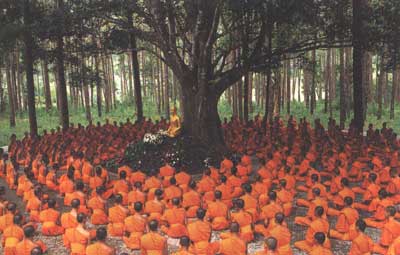สารบัญ
Story of Dabbamatla-putta
when Dabbamallaputta was in his mother's womb, nearing his time of birth, his mother suddenly died. Many people were under the impression that he also, must have perished with his mother. So his relatives took the body of his mother to a place of cremation according to Indian tradition. As the flames of the funeral pyre began to engulf his mother's body, her womb opened and the body of Dabbamallaputta emmerged and came to rest upon a tuft of Elephant grass. If any other child had come into this world under such dramatic circumstances, it would most certainly not have survived. Nevertheless, Dabbamallaputta'ร birth was indeed a miracle. He grew up under the watchful care of his grandmother.
Dabbamallaputta escaped death twice. First when his mother suddenly passed away; under normal circumstances this would have meant death for the unborn child. However, he did not die. Second, when he escaped his mother's womb as her body lay on top of the funeral pyre, and came to rest on a tuft of Elephant grass. That is where his name originated. Mallaputta meaning the child of the Malla family, and being his family name, and Dabba meaning wild grass.
Later on the young Dabbamallaputta ordained as a novice. While a novice, Dabbamallaputta earned the respect and admiration from the monks at Wat Jetavana. The temple community saw Dabbamallaputta as a person of great knowledge and talent, such individuals being hard to find in this world.
The Story of Rathafala
Like many other holy men before ordaining, Rathapala desired worldly possessions. Nevertheless; the mercy, wisdom, and purity of the Buddha's teachings, managed to guide Rathapala along towards the path of ordination.
Rathapala was the son of a wealthy family in Kururath Province, India. Before he was ordained, he lived a sheltered and comfortable life, more so than many of his fellow men. However,Rathapala chose to be ordained. Many in his province and village criticized and gossipped about the news of his decision to be ordained. Even the Raja who ruled over Kururath, felt that Rathapala's decision to be ordained was indeed strange,

when the Raja inquired why a person might ordain, the response he was given, was as follows. When confronted with one or all of the following four circumstances, a person usually seeks refuge in the monkhood
1. Old Age - The deterioration of one's physical state and abilities, finding that your life has no more roads to journey on.
2. Illness & Disease - When one's body and health is afflicted with some illness and you are unable to move forward in the world.
3. Poverty - when you reach that point in your life where you no longer have monetary resources to advance your life.
4. Shunned by Society - when your peers or those in your community no longer accept you
One or all of these circumstances often push people to turn towards a life of refuge in the monastic community.
The Raja commented that Rathapala was not yet old, he was still strong and healthy, living a life free from poverty and surrounded by many family and friends who loved and respected him. Why then, has he chosen to be ordained?
In ancient time, many men chose to be ordained when confronted with four circumstances, although they had no faith in religion. Even during the time of Lord Buddha, many people were ordained without faith in Buddhism. It is therefore not surprising that the Raja found Phra Rathapala'ร decision to be ordained, a curious thought indeed.
Phra Rathapala explained to the Raja that he had his own four reasons for ordination these having been taught to him by Lord Buddha. That in one's life there are two types of suffering: suffering that is unavoidable (past), and suffering that is avoidable (present).
"All men are bound by unavoidable suffering from previous lives, and yet we still reach out and grasp at more suffering to add on to those from the past."
These unavoidable suffering comprises:
1. That ageing is something that cannot be avoided. Those who are wise should be always aware of this.
2. All living things are mortal. Death is something no living being can avoid.
3. No one ever truly owns anything, for when you die, you cannot take anything with you.
Suffering that is avoidable grows out of one's constant desire for more. People with such suffering are those who hunger incessantly and are never satisfied. It is because they are a slave to their never ending desires. People want everything that they see, and even once they get it, they still yearn for more.
The 'Endeavours of the Arahants to Preserve 'Buddhism
Buddhism has managed to grow and prosper to the present day, even though the Buddha passed away over 2,500 years ago.lt will continue to advance further, ad infinitum. The following is what Lord Buddha taught to Ananda before passing away, "Ananda, after I leave this world, my Teaching (the Dhamma) will be your teacher in my place."
The Buddha blessed us with his Teachings and his sense of Discipline to carry us forward in his place.' The gifts he gave us have passed the test of time and shown themselves to be timeless. Due to the relevance of the Buddha's teachings, despite the passage of time, his disciples have been able to pass on the Dhamma to this present time.
Even more important, the determination and faith of Lord Buddha's disciples, and their desire to spread the Buddha's teachings, are truly deserving of our respect for their endeavours, so that we may learn from their life story, and set them as an example to follow. One of these monks whom we can learn from is Rohana




